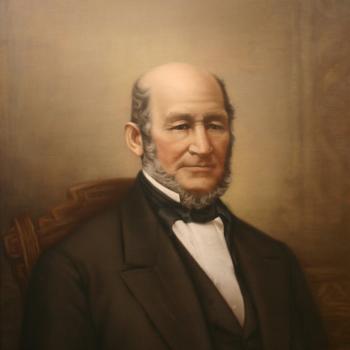
The CBF’s move transition to become a progressive theological organization was fueled by a decision made at the beginning. They would not make a statement of faith. Avoiding making a statement of faith was done, most assuredly, to avoid controversy, but it was also done based on a mistaken premise. The premise behind the decision was theological clarity produces division. Unfortunately, the leaders of the CBF were not correct. It is not clarity that produces division but ambiguity. Ambiguity produces anxiety. Clarity invites people to join the cause. Clarity creates purpose. Clarity reminds people who the organization is and is not. Clarity is what keeps an organization on track. Clarity is central to mission and comes before mission.
The Freidman option, as I have called it, is based on taking clear “I believe” stands. Rather than trying to change an organization from the outside in, taking “I believe” stands offers a way forward without conflict. Taking “I believe” statements invites others to do the same. In staking out theological positions, I hope to invite others to it as well, and when we find similarities and consensus we can dream of a way forward.
I believe there are three central theological markers for Baptist life: the centrality of Jesus Christ, the authority of the Bible, and the imperative of missions. When I argue for the centrality of Jesus Christ, I argue the focal point of human history is the Christ event. In His death on the cross, Jesus Christ has made peace between God and humanity. Scripture states the Jesus became sin in order that we might become right with God. In the death of Jesus, the power of sin has been overcome. In His resurrection, Jesus broke the power of death. In His ascension, Jesus is now governing the universe through His almighty power. When Christians say “Jesus Christ is Lord,” they are arguing that despite all appearances to the contrary, Jesus reigns. Jesus the Savior reigns now and forever. He reigns over all things, at all times, and at all places. Jesus saves, and Jesus alone.
Baptists have long been people who highly value Holy Scripture. So, it is a great irony that what should have been a source of unity has become a source of division. Various theories of the inspiration of Scripture have been used to divide Baptists. In fact, one of the charges laid against moderates was “they don’t believe the Bible.” Moderates countered that the fundamentalists worshipped the Bible and not Jesus; they were “Biblidolaters.” For me, I believe the Bible is totally true and trustworthy. When I argue for the authority of the Bible, I am suggesting that the Bible is “ . . . the supreme standard by which all human conduct, creeds, and religious opinions should be tried.”[1]When the Bible speaks on a subject, its council cannot be ignored, its judgments cannot be put aside, and its assurances cannot be rendered moot. The Bible is authoritative because it is given by God to us.
Lottie Moon and Annie Armstrong are important to Baptists because they fulfilled the Baptist principle of faith sharing. They believed that the sharing of the Faith is central to what it means to be a believer. Believing the Gospel command that believers are to go into the world and make disciples, Annie and Lottie went. They are heroes for it. We Baptists cannot be comfortable with the idea that there is any single person who has not heard the Good News of Jesus Christ. For us, this Good News is the single best and most important gift in life. One author once said the early church shared its faith in the same way a bird sings. I believe that any authentic expression of Baptist life will have faith sharing as a normal and normative aspect of its existence.
To secure these three theological markers and prevent denominational drift, I confess the Apostle’s Creed. The very word “creed” can raise Baptist hackles. In fact, when the Dean of Truett Theological Seminary, Todd Still, did some self-differentiation of his own in his convocation speech entitled “Here I Stand,” he was sure to say he was not being creedal. A few years ago, a group of CBF thinkers (including the current Executive Director of the NCCBF, Larry Hovis) tried to develop some theological clarity in the organization and suggested the Apostle’s Creed. This suggestion was rejected due to concerns about creedalism. I recognize that many Baptists will resonate with the slogan, “No Lord but Christ, and no creed but the Bible.” Slogans seldom make for good theology, however. The Apostle’s Creed is a marvel of clarity and profundity. In a few short sentences, it summarizes the Gospel. It has served as the definition of orthodoxy since its origin and is a good place to start.
Obviously, some might argue that the tenants of the Creed are not under debate in the CBF. While in some respects that is true, the CBF does have pastors and important voices who deny major portions of the creed. For example, Chuck Queen, pastor of Immanuel Baptist Church in Frankfort KY, is willing to throw out the exclusivity of salvation in Christ, the perfection of Christ, the sinlessness of Christ, and finally the deity of Christ.[2]One important voice in CBF life has even noted that the passion to reach people for the Gospel of Christ has been replaced with social ministries that focus on life improvement.[3]While no statement of faith can prevent all heresies from emerging in Baptist life, a commitment to the Apostle’s Creed would demonstrate a commitment to orthodoxy and would ensure that heterodox and heretical voices would not be given platforms in CBF gatherings, have prominent places in CBF publishing houses, or be published favorably in CBF affiliated news outlets.
As important and helpful as the Creed is, it has not prevented mainline traditions from trending left. Further, it is not specific on important doctrines like baptism, the nature of the Bible, or ecclesiology. So, another anchor point is needed to secure the theological markers I find central. For me, the 1963 Baptist Faith and Message (BF&M) is helpful. In fact, when people ask me for a summary of my thought, I will point to the BF&M.
While it is not a perfect document—no document crafted by humans can be—it is a good synopsis of the faith as practiced by Baptists. I do, however, believe there needs to be a caveat. There is a problem with the language on the Scriptures, the “Jesus criterion.” The Jesus criterion is “ . . .The criterion by which the Bible is to be interpreted is Jesus Christ.” Used correctly the Jesus criterion is the assertion that the Bible is a book fully about Jesus Christ. The Law points us to our need for a Savior, the Prophets point to the coming of the Savior, the Gospels describe the life and ministry of the Savior, Acts describes the immediate aftermath of the Savior’s resurrection and the early Church, the Letters describe how to live in the light of the Savior, and the Revelation describes the return of the Savior. When there is a question about how to interpret a Bible passage, the question is answered by looking to the Savior who inspired the writing of the Bible. Used rightly, the Jesus criterion is beautiful and helpful.
What has happened in moderate life is the Jesus criterion has been sloganized and abused. It has morphed into something like, “Well, Jesus never said a word about that.” If you encounter someone this kind of argument, you are safe in the assumption that they are pushing bad theology. Here is why:
1) There are many things Jesus is not recorded to have spoken about that are indeed wrong. I have no memory of Jesus speaking about animal cruelty, for example. Nor do I recall Jesus speaking about the topic of opiate abuse. Yet, we know these things are wrong.
2) Jesus upheld the law. He said, “. . . anyone who sets aside one of the least of these commandments and teaches others accordingly will be called the least in the Kingdom of Heaven” Mt. 5:19 NIV. Jesus, therefore, is not teaching something akin to the suggestion that only what He says now matters, He demands that the whole counsel of Scripture be obeyed.
3) One cannot really say that Jesus said nothing about any topic. The most one can say is the Gospel writers did not record Jesus saying something about a topic. Any argument as to why is based on speculation. Some speculate that the Gospel writers did not record Jesus speaking on a topic is tantamount to its lack of importance. Let me give an alternative theory. Paul wrote first with much of his correspondence occurring between 50 and 58. Historians estimate Mark and were written around 70 with Matthew coming afterward. Scholars often date John to the 90s. Also consider that Luke was a companion of Paul’s, and must have known the contents of Paul’s letters. Mark was likely a protégé of Peter, and Peter’s letters themselves demonstrate an awareness of Paul’s letters and refers to them as Scriptures. With that evidence, could it not be the case that the Gospel writers knew of Paul’s writing and did not think it necessary to reiterate everything Paul had said? In any case, the “Jesus did not say it” meme is, at best, an argument from silence and, at worst, a cynical effort to avoid the content of the rest of the Bible. The abuse of the Jesus criterion is causing significant issues in how moderates interpret the Bible. It needs significant clarification.
Moderates have to wrestle with a significant fact, the leadership of the CBF has set aside any traditional understanding of the authority of the Bible. On the most controversial issue it has faced, the CBF did not engage with any of the relevant Bible texts. In the Illumination Report, the authors give short sections of interpretation on Biblical texts devoted to unity within the Church but gave no Biblical or theological insight into the LGBTQ question. Isn’t that odd? One cannot maintain that the Bible is authoritative without seeking its council on the issue at hand. One wonders what would have happened if Biblical texts on the issue were examined in as great a depth as those dealing with unity. Unity is a noble thing, a Biblical thing. Pursuing unity in this way, however, elevates unity over Scriptures. The 1963 BF&M’s strong statement on the authority of Scriptures would rule the CBF’s practice on this issue out of hand.
After securing—as much as they can be secured—the three theological markers with the Creed and the BF&M, I make a much humbler suggestion. I really do not like the term “moderate.” It really refers to a central distance between extremes and is therefore reactionary. I don’t know what to replace “moderate” with, but I don’t think it is a good descriptor.
So, here is how I express my Freidman option: I am a passionate follower of Jesus Christ; I have given my life to serve in His cause. I proclaim His Gospel with joy, and I serve Him with all that I have and all that I am. My faith is informed by the Apostle’s Creed and nurtured by the Bible. I believe in the centrality of Christ, the authority of the Bible, and the imperative of missions. If these are things you treasure, I’d love to hear from you.
Grace and Peace
[1]1963 Baptist Faith and Message.
[2]Here is one example of Queen’s work. https://baptistnews.com/article/discovering-the-human-jesus-opens-new-possibilities-for-becoming-more-like-jesus/#.XhzJsC2ZPBI
[3]https://baptistnews.com/article/caught-in-the-middle-is-there-still-a-place-for-centrist-baptists-like-me/#.XhzTBC2ZPBI















